

PIKESVILLE, Maryland — Eight of Elie Wiesel’s fifty-seven books could be called “Theological Biographies.” They are books on biblical figures and stories about Hasidim. They are Souls on Fire (1972), Four Hasidic Masters and Their Struggle Against Melancholy (1978), Somewhere a Master (1982), and Wise Men and Their Tales (2003), which focus on Hasidim. Messengers of God (1976), Five Biblical Tales (1981), and Sages and Dreamers (1991) look at biblical people. Filled with Fire and Light is a 2021 posthumous book addressing biblical, Talmudic, and Hasidic figures.
–A good story in Hasidism is not about miracles but friendship and hope – the greatest miracle of all.
–Hasidim is a tree with many separate branches. They are all alive because the tree is alive.
–A Rebbe said, “Everything I know I learned earlier when I sat in the last row, out of sight. Now I am here, occupying a place of honor (as a Rebbe), and (I realize) I don’t understand.”
–What summarizes the Hasidic movement: ask the utmost of people, but accept them as they are.
–One Rebbe told of his wild life as a youngster. One day, he saw his dad looking at his tefillin (two religious boxes containing biblical passages) with tears rolling down his cheeks. From that moment on, the future Rebbe changed his ways. His father’s tears succeeded where his sermons had failed.
–Forgetfulness is a gift from God. If people could not forget certain things, if they constantly remembered their day of death, they would be unable to live. They would no longer work, build a house, or care for children.
–One must never avoid asking questions.
–Asked why he did not come to the holiday synagogue service, the Rebbe admitted that he heard a child crying while walking to the synagogue; how could he leave this child alone?
–A disciple could not understand why the serpent in the story of Adam and Eve was punished so that it would forever crawl and eat dust. Is this punishment? If it were given dust to eat, it would never go hungry. The Rebbe explained that it is the worst punishment: never to go hungry or to seek or desire anything.
–A disciple came to the Rebbe and complained about many unanswered questions, suffering, and injustice. The Rebbe replied, “Let us be angry together.”
–Love of God only exists if it brings you closer to other humans. God’s love is linked to the love of all His creations. One without the other leads to idolatry and inhumanity.
–A disciple argued with a Rebbe, “God created the universe in six days – and it’s ugly!” The Rebbe snapped back, “Would you have done better?” The forlorn disciple stammered, “Yes.” The Rebbe shouted, “Then what are you waiting for? Start working – right now!”
–A wealthy man refused to give charity. He relied on God. He said, “I believe in God and His justice. If He had wanted you to have money, He would have given it to you, not me. Why do you expect me to oppose God’s will?” The Rebbe commented, “When it comes to charity, be an atheist; do not use God as an excuse; help those in need of help.”
–A Rebbe gave charity to a drunkard who headed straight to the nearest inn for another drink. “Why aren’t you more discerning?” someone asked the Rebbe. The Rebbe answered, “God gave me money, didn’t He? Why should I be choosier than He?”
–The biblical book Genesis tells us that Cain spoke to his brother Abel – but the text does not tell us what he said to him. Scripture wants us to know that Abel did not listen to him. This kind of silence results in death.
*
Rabbi Dr. Israel Drazin is a retired brigadier general in the U.S. Army Chaplain Corps and the author of more than 50 books.